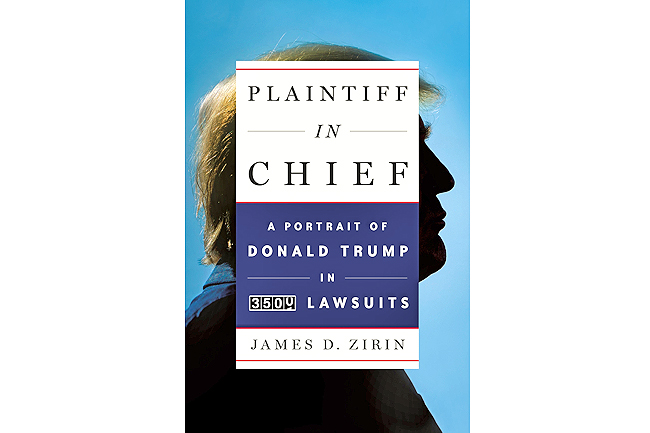WASHINGTON, D.C. USA- Trump’s legal strategy: If you can’t beat the case, beat the system
.
 THE WASHINGTON POST – The United States (US)Donald Trump’s friend, lawyer and mentor Roy Cohn had an adage: “Ignore the law,” he liked to say, according to a new book by attorney James D Zirin. “Who’s the judge?” He meant that, although idealists might imagine that the courts were august and impartial, the judiciary was in fact made up of people who could be bullied or bamboozled or bought off. To Cohn, politics was a brutal and unfair game, and the law was just an extension of politics, with extra paperwork. If you understood that, he believed, you could get a huge headstart on the idealists.
THE WASHINGTON POST – The United States (US)Donald Trump’s friend, lawyer and mentor Roy Cohn had an adage: “Ignore the law,” he liked to say, according to a new book by attorney James D Zirin. “Who’s the judge?” He meant that, although idealists might imagine that the courts were august and impartial, the judiciary was in fact made up of people who could be bullied or bamboozled or bought off. To Cohn, politics was a brutal and unfair game, and the law was just an extension of politics, with extra paperwork. If you understood that, he believed, you could get a huge headstart on the idealists.

. .
For a young Trump, this was a foundational lesson, according to Zirin. In his book Plaintiff in Chief: A Portrait of Donald Trump in 3,500 Lawsuits, Zirin argued that Trump learned to see the law as Cohn did: “not as a system of rules to be obeyed… but as a potent weapon to be used against his adversaries”. Trump sued often but rarely won big.
Winning in court wasn’t always the point: The lawsuit itself was the thing, a tool of intimidation cloaked in legalese, an outgoing missile that left your enemies buried in costs and hassle. That approach had costs for Trump, too.
But he could bear them. He lost friends, wives, lawyers and business partners – but always found new ones, who thought their fate would be different.
Zirin has good timing: His book arrives as Trump faces the legal fight of his career, using all the tools he honed in this lifetime of lawsuits.

. .

So far this year, Trump has sued those investigating him, including House committees and the Manhattan district attorney, to stop them from obtaining his financial documents. He has also attacked those pursuers out of court, trying to tar his enemies as partisans seeking “a coup” to overturn the 2016 election. Instead of submitting to precedent, he has ignored it – and posited a theory that, in the eyes of the law, a president is like a temporary emperor.

. .
In a recent appeals court hearing, a judge asked Trump’s attorney what would happen if the President shot somebody on New York’s Fifth Avenue.
“Local authorities couldn’t investigate? They couldn’t do anything about it?” Judge Denny Chin asked, adding, “Nothing could be done? That is your position?” “That is correct,” said Trump’s private attorney.
All of it came from the playbook that Zirin lays out: confuse, deny, delay. If you can’t beat the case, beat the system, by exploiting its human flaws.
As a former federal prosecutor and longtime private attorney, Zirin has depended on the idea that the law is legitimate and no man is above it. So he sees Trump’s life – and now his presidency – as an attack on that legitimacy. “Trump’s position,” he wrote, is “that he is either above the law or released from the obligation of observing it.”

. .
If everybody starts to think that way, Zirin said, the system collapses.
Despite its subtitle, Zirin’s book isn’t actually about all 3,500 lawsuits Trump has been involved in – the number comes from a USA Today report, and Zirin admits that he hasn’t read them all or even counted them for himself.
Instead, he focusses on a smaller set of legal cases from various phases of Trump’s life: his days as a Manhattan developer, his bankruptcy-plagued time in Atlantic City, the allegations of misconduct during The Apprentice years and his time fighting the Mueller investigation as president.
The book has flaws: It is overlong and repetitive. The Mueller chapter, in particular, is breathless and disjointed, as the author tried to keep up with the fast-unfolding saga.
But this is still one of the most useful and readable accounts of Trump’s early career in business. Zirin does not get lost in the clouds of flimflam that have spewed out of Trump for decades, which other biographers have taken as their mission to prove or disprove. That leaves them wandering endlessly in a fog of old boasting, trying to evaluate claims about 30-year-old real estate deals or now-demolished casinos.

. .
Instead, Zirin focusses on a pattern that repeats across the president’s adult life. Trump discovered early on that, if you’re wealthy, most of life – including much of the law – operates on an honour system. People obey the rules without being forced to do so, out of shame or respect or fear. If you just don’t obey, Trump realised, these systems take a long time to catch up, if they ever do. “What is clear in the law becomes contestable for Trump,” Zirin wrote.

. .
As a reporter for The Washington Post, I’ve covered Trump since the start of 2016. I first saw him apply this approach to the honour system that governs tax-exempt charities. It turns out that the IRS, which enforces charity law, essentially outsources most of its enforcement to the charities themselves: If they break the law, they’re supposed to report it. Trump’s charity – the Donald J Trump Foundation – repeatedly engaged in conduct that was in violation of the rules, such as aiding his presidential campaign, paying off legal settlements for Trump’s private businesses and buying large paintings that featured Trump himself. He didn’t volunteer the violations to the IRS. It wasn’t until after my reporting, and a 21-month investigation by the New York attorney general, that a lawsuit was filed. It took until this month for Trump’s actions to finally catch up with him: A New York judge ordered him to pay USD2 million in damages, a stunning rebuke for a sitting president.

. .
Zirin describes how Trump applied the same approach to duck, minimise or avoid consequences for a number of questionable actions by his businesses. One was Trump University, a programme of real estate seminars that was accused of fraud after taking thousands from customers and providing little education of value. Trump was sued, and he settled – after winning the presidency. “So who won and who lost?” Zirin wrote.
“Trump lost little. He only had to give back the fees he had stolen from his victims. He did not admit guilt.”
“In the world of Trump, admitting guilt is shameful,” Zirin explained. “Redemption doesn’t come with confession.”

. .
Zirin’s book is a valuable guide to Trump’s mindset and a good primer for the months ahead as a series of investigations close in on the President. Back to Cohn’s old saying: “Who’s the judge?” Trump seems to believe he can count on the Supreme Court, to which he appointed two justices, to deflect prosecutors’ inquiries. But he also faces impeachment proceedings in the House and the Senate, where his fate will be decided by politicians, not judges.
Trump, of course, has boasted that he will never make like Richard Nixon and resign. Zirin seems to have doubts. In cases like the one involving Trump University, Trump had vowed never to give in – and then gave in, settling the case, walking away, declaring victory in retreat. Even Cohn, in the end, couldn’t beat the system forever: He was disbarred in 1986, five weeks before he died.

. .
Zirin closes the book with a quote from Cohn about how hard it is to be where Trump is now, fighting the system on every side at once: “No public man can remain indefinitely at the centre of controversy.” / David Fahrenthold










